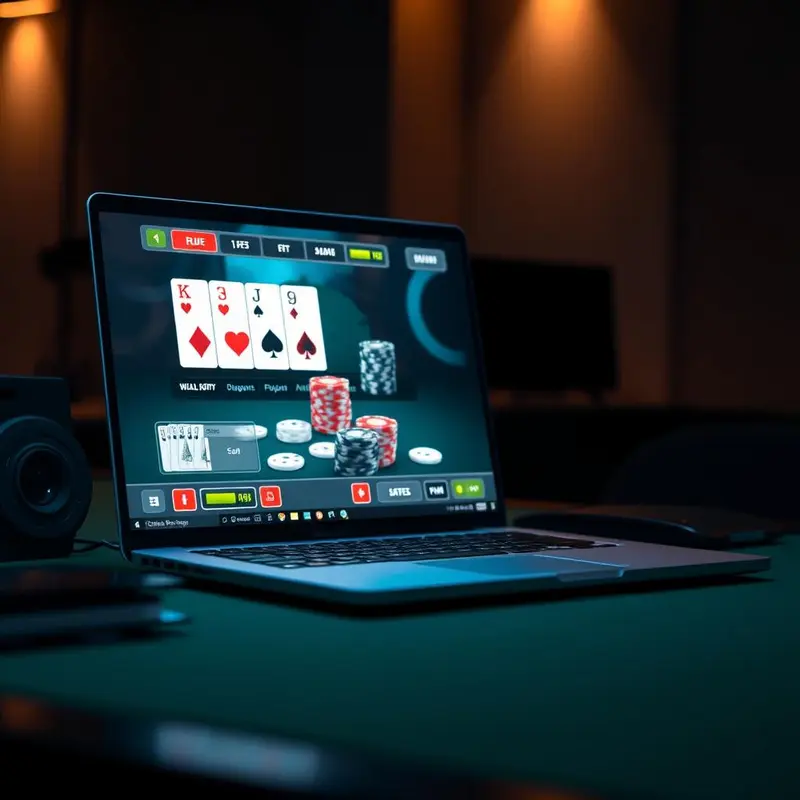Poker. That classic game where skill, guts, and a bit of luck collide. It’s not just thriving online; it’s a full-blown digital battlefield where millions go head-to-head every day. If you want to be more than just another player clicking buttons—if you want to actually start winning consistently—then getting a rock-solid grip on the rules is step one. From the basic turn order to knowing which hand crushes which, nailing these essentials will sharpen your instincts and make the whole game a hell of a lot more fun. This guide’s got two main parts: first, we’ll break down poker’s core nuts and bolts, including the different game types and your moves at the table. Second, we’ll get into the smart strategies that are born from these rules, getting you primed to bet with real confidence and skill. Whether you’re a total greenhorn at online poker or a vet looking to tighten up your game, these chapters will show you how knowing the rules inside and out is what separates the fish from the sharks at the virtual felt.
Mastering the Essentials: Core Poker Rules Every Online Player Must Grasp
Look, understanding the basic rules of poker isn’t just helpful; it’s your only ticket to success, especially in the fast-paced world of online play. At its very core, poker is a fight. You win chips or cash in one of two ways: either you have the best five-card hand when the dust settles, or, more excitingly, you make everyone else believe you do, forcing them to fold before you even have to show your cards. Sure, there are a bunch of different poker flavors out there, but the basic rhythm of the game is pretty much the same, and it’s something every serious player needs to have burned into their brain.
The action starts when every player gets their own private cards, often called “hole cards.” The number of cards you get depends on the game. Let’s take Texas Hold’em—the undisputed king of online poker. In Hold’em, everyone gets two hole cards. These are your secret weapons, for your eyes only, until the very end. The real drama in Hold’em and similar games comes from the “community cards” – cards dealt face-up in the middle of the table that *everyone* can use. These shared cards are what make the game so strategic and lead to those wild swings and brilliant bluffs as the hand plays out.
As a hand unfolds, you’ll go through a few rounds of betting. This is where the pot builds up and where you can send signals about how strong your hand is (or isn’t). Your options are to check, bet, call, raise, or fold. A check is basically saying, “I’m good for now, I’ll pass,” but you can only do it if no one has put money in the pot yet in that round. A bet is you putting chips in, daring everyone else to match you. A call is you matching someone else’s bet to stay in the game. A raise is you upping the ante, putting the pressure back on your opponents. And a fold? That’s you making the smart (or tough) call to throw your hand away and live to fight another day, giving up any claim to the chips in the middle.
One of the absolute non-negotiables of poker is the hand ranking system. This is the law that decides who wins at the end. From best to worst, it starts with the mythical Royal Flush—the unbeatable combo of an Ace, King, Queen, Jack, and Ten, all of the same suit. Then you’ve got a Straight Flush, Four of a Kind, a Full House, a Flush, a Straight, Three of a Kind, Two Pair, One Pair, and if all else fails, just a lonely High Card. This hierarchy is your bible; it dictates every move you make, every chip you risk.
Let’s use Texas Hold’em as our main example again. The way the cards are dealt gives the game its pulse. After you get your two hole cards, you see the “flop” – three community cards laid out for all to see. Then comes the “turn,” the fourth community card, and finally the “river,” the fifth and final card. Through these stages, you’re constantly trying to piece together the best possible five-card hand using your two secret cards and the five shared ones. These betting rounds are where the real mental warfare happens, a chance to read your opponents’ souls based on how they act at each turn.
Where you’re sitting at the table, your “position,” is a huge, huge deal. The dealer button, which moves one spot to the left after each hand, tells you where you are in the pecking order. Generally speaking, acting last in a betting round is a massive advantage. Why? Because you get to see what everyone else did before you have to make your move. The betting usually starts with the players to the left of the “blinds”—these are small, forced bets that get the pot started. In most games, you’ll see a small blind and a big blind.
Sometimes, especially in tournaments, you’ll also have “antes.” These are small bets every single player has to put in before the cards are even dealt. They keep the pot from getting stale and stop people from playing way too timidly. You have to pay attention to these forced bets and change up your strategy based on them and what your opponents are doing.
And a quick note on online poker etiquette (which is also just about fair play): always act when it’s your turn. The software will enforce this anyway, so your job is to focus and make your decision in a reasonable amount of time. Acting out of turn or taking forever can just gum up the works for everyone.
For those ready to move past the basics, understanding the different betting structures is a whole new level of the game. No-Limit games are the wild west – you can bet all your chips at any moment, leading to explosive action. Limit games are more of a chess match, with fixed bet and raise sizes that demand patience and precision. And Pot-Limit games? They’re a nice middle ground, letting you bet or raise up to whatever is currently in the pot, balancing aggression with control.
Really getting these fundamentals into your bones is what gives you the power to make smart, confident plays online. It also shows you respect the game and the other players. This knowledge is the first, most crucial step to mastering the deeper strategies and truly enjoying the rich, competitive world poker has to offer.
For more insights into playing card games online for real money, including poker strategies and responsible gaming tips, check out this comprehensive guide on online card games.
Mastering Poker Strategy: Using Betting, Position, and Hand Selection to Win
Okay, let’s be clear: mastering poker is about way more than just knowing what beats what. It’s about using your brain to think strategically about how you bet, where you’re sitting, and what hands you even bother playing in the first place. All these pieces have to work together to create that dynamic game of skill, psychology, and calculated guts that we all love.
Betting in poker? It’s the engine of the game. Every round of betting is your chance to either take control of the hand or react to what your opponents are trying to do. Your choices – to bet, call, raise, or fold – shouldn’t be random clicks. They need to be backed by a plan. A really effective and common strategy is called “tight-aggressive.” This just means you’re selective about the hands you play (the “tight” part), but when you do decide to play a strong hand, you play it hard with bets and raises (the “aggressive” part). This puts your opponents in tough spots and often makes them fold weaker hands. But just as important is knowing when to fold. The players who stubbornly chase long-shot draws or bluff without a good story are the ones who bleed chips. Every single bet you make should have a purpose, backed by a solid read on the table and what your opponents might be holding.
Your “position” at the poker table is one of the most underrated, yet most powerful, tools you have, especially when you’re starting out. Your seat, relative to that little dealer button, determines when you have to act. Acting last in a betting round? That’s a massive advantage. You get to watch everyone else check, bet, or raise before you have to risk a single chip. That information is pure gold. It lets you make much smarter decisions, whether that’s raising to take the initiative, or just quietly folding a hand that’s not worth the risk. Players who have to act early are flying blind, and that’s a tough spot to be in. Understanding and using your position is a total game-changer.
At the end of the day, winning hands come from a smart mix of good betting and using your position, all to give yourself the best shot at having the best five-card hand. When the betting is done, the showdown decides the winner based on the standard poker hand rankings. Knowing these rankings by heart—from a royal flush all the way down to a measly high card—is absolutely essential for judging your own hand and trying to figure out what your opponents might be packing.
But it’s not just about knowing the rankings. A really good player also gets the idea of “pot odds.” That’s just a fancy way of saying you’re comparing how much money is in the pot to how much it’s going to cost you to call a bet. This bit of simple math helps you decide if staying in a hand is actually a good investment in the long run. For instance, if the pot is offering a huge reward for a relatively small risk, it can be a smart play to call, even if you don’t have the best hand just yet. Ignoring pot odds? That’s a fast track to going broke, leading you to chase hopeless draws or stick around in hands where you’re a massive underdog.
Weaving all these strategic ideas together is what turns poker from a simple game of cards into a complex battle of minds. Playing fewer, but stronger, hands, using your position to gather intel, betting with a purpose, and knowing when to get out of the way – these are the habits that will level up your game. These techniques also help smooth out the crazy ups and downs of poker by cutting down on silly losses and giving you more chances to win those big, juicy pots when you do have a strong hand.
Whether you’re just playing for fun at home or battling it out in competitive online tournaments, mastering how to apply these poker rules strategically will give you a serious edge. With practice, you’ll start to develop a real gut instinct for the flow of the game—a skill that helps you guess what your opponents are up to and react effectively. As you get better, these principles will become second nature, guiding you toward making consistently winning moves.
For those of you looking to really get into the competitive side of things, digging into detailed guides on online poker tournaments can give you amazing insights into more advanced strategies and how to handle the unique dynamics of digital poker. Checking out these resources can seriously sharpen your skills and get you ready for the ever-changing challenges of the game.
By bringing together smart betting, a keen sense of your position, and savvy hand selection, you’re laying the groundwork for confident, winning play that doesn’t just respect the timeless rules of poker but fully embraces its deep, strategic heart.
Final thoughts
Getting a handle on poker rules isn’t just about memorizing a list; it’s about really *getting* the mechanics of the game so you can unlock your true potential at the online tables. From knowing the hand rankings cold and understanding all your betting options, to mastering the power of your position and making smart, strategic plays, these rules are the absolute spine of every good decision you’ll make. The connection between knowing the rules and winning is undeniable—players who truly get these fundamentals just make smarter bets, read their opponents better, and seriously increase their chances of success. When you embrace all these pieces together, poker stops being just a pastime and becomes a real skillful challenge, where every hand is a fresh opportunity. The virtual tables are waiting for those who are ready to play with confidence, clarity, and a deep understanding of what truly makes the game tick.
Ready to Elevate Your Gambling Experience to the Next Level? Contact www.topgamb.com today and let our expert team guide you to a more exciting betting adventure with top-notch tips and picks just for YOU! Discover your Winning Edge now!
Learn more: https://www.topgamb.com/casino-rankings/
About us
The website TopGamb.Com is a trusted online casino review and ranking site dedicated to helping users find the best online gaming options. The site provides unbiased reviews, expert rankings, and comprehensive guides to help users make informed decisions. For example, it ranks different online casinos based on factors such as their user-friendliness, variety of games, and payout rates.















